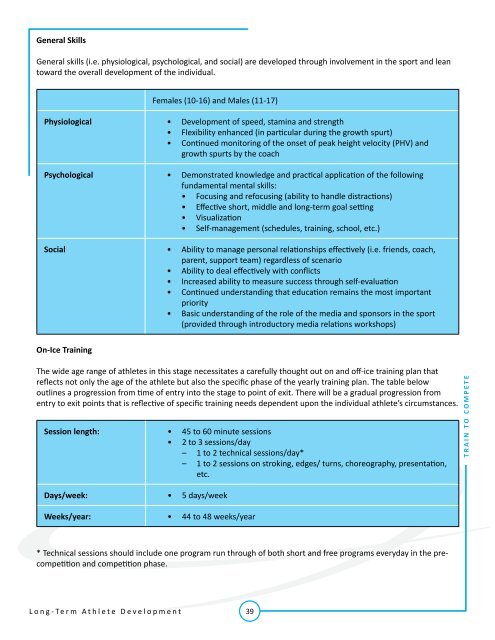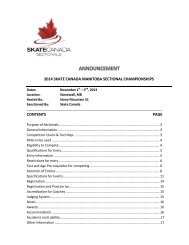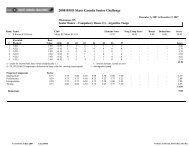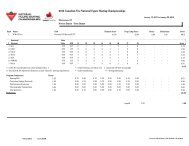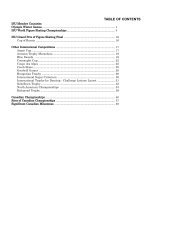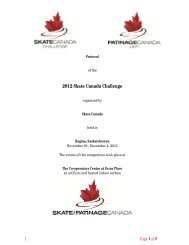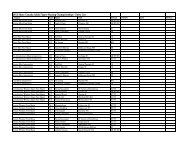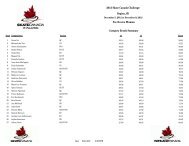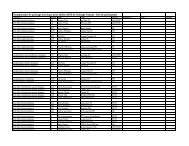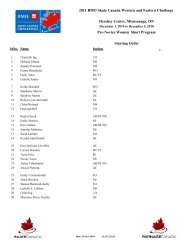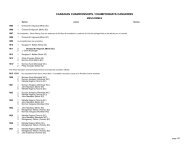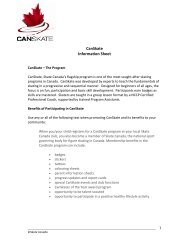LONG-TERM ATHLETE DEVELOPMENT - Skate Canada
LONG-TERM ATHLETE DEVELOPMENT - Skate Canada
LONG-TERM ATHLETE DEVELOPMENT - Skate Canada
You also want an ePaper? Increase the reach of your titles
YUMPU automatically turns print PDFs into web optimized ePapers that Google loves.
General Skills<br />
L o n g - Te r m A t h l e t e D e v e l o p m e n t<br />
39<br />
865 Sheord Road, Ottawa, Ontario K1J 1H9<br />
General skills (i.e. physiological, psychological, and social) are developed through involvement in the sport and lean<br />
Phone 613.747.1007 I Toll Free 1.888.747.2372 I Fax 613.748.5718 I Toll Free Fax 1.877.211.2372<br />
toward the overall development of the individual.<br />
Females (10-16) and Males (11-17)<br />
Physiological • Development of speed, stamina and strength<br />
• Flexibility enhanced (in particular during the growth spurt)<br />
• Continued monitoring of the onset of peak height velocity (PHV) and<br />
growth spurts by the coach<br />
Psychological • Demonstrated knowledge and practical application of the following<br />
fundamental mental skills:<br />
• Focusing and refocusing (ability to handle distractions)<br />
• Effective short, middle and long-term goal setting<br />
• Visualization<br />
• Self-management (schedules, training, school, etc.)<br />
Social • Ability to manage personal relationships effectively (i.e. friends, coach,<br />
parent, support team) regardless of scenario<br />
• Ability to deal effectively with conflicts<br />
• Increased ability to measure success through self-evaluation<br />
• Continued understanding that education remains the most important<br />
priority<br />
• Basic understanding of the role of the media and sponsors in the sport<br />
(provided through introductory media relations workshops)<br />
On-Ice Training<br />
The wide age range of athletes in this stage necessitates a carefully thought out on and off-ice training plan that<br />
reflects not only the age of the athlete but also the specific phase of the yearly training plan. The table below<br />
outlines a progression from time of entry into the stage to point of exit. There will be a gradual progression from<br />
entry to exit points that is reflective of specific training needs dependent upon the individual athlete’s circumstances.<br />
Session length: • 45 to 60 minute sessions<br />
• 2 to 3 sessions/day<br />
– 1 to 2 technical sessions/day*<br />
– 1 to 2 sessions on stroking, edges/ turns, choreography, presentation,<br />
etc.<br />
Days/week: • 5 days/week<br />
Weeks/year: • 44 to 48 weeks/year<br />
* Technical sessions should include one program run through of both short and free programs everyday in the precompetition<br />
and competition phase.<br />
T R A I N T O C O M P E T E


